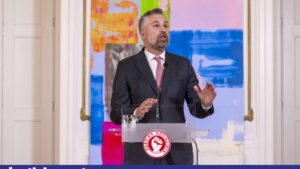Government rejects PS counter-proposal of AD’s own counter-proposal
More ‘crunch talks’ are ahead as the country enters a(nother) decisive week regarding the 2025 state budget (which the president has insisted must be approved).
After months of discussions, red lines, and ‘irrevocable announcements’, the current AD coalition government, for all its efforts, appears not to have rival PS Socialists onboard.
Without the PS vote/ abstention, the budget will not pass: left wing parties are dead-set against any budget of what they call ‘the right’ and more right wing parties CHEGA and Iniciativa Liberal have their own reasons for showing lack of enthusiasm for the minority government’s proposals.
And without a ‘pass’, the country would be headed for new elections (the third in as many years).
Thursday is the moment when the budget document will be presented to parliament ahead of its ‘first reading’ on October 31.
This is followed by the so-called specialised debate in parliamentary committees, where ministers are to present the parts of the budget for their specific areas. The process then ends with the final reading and vote on November 28.
After more than three months of more or less public debate, back and forth between the government and the main opposition Socialist Party, last week the prime minister, Luís Montenegro, and the PS leader, Pedro Nuno Santos, met twice alone to negotiate the possibility of the latter’s members of parliament abstaining in the vote, which would enable the government to get the bill through.
Firstly, on September 27, Santos insisted on rejecting the government’s IRS Jovem plan for cuts in personal income tax for those up to 35, and planned cuts in IRC corporate income tax – which at 21% is the highest corporate income tax charged in the EU – arguing that this was irresponsible in terms of public finances.
The PS leader presented alternative proposals such as an extraordinary 1.25% increase in pensions that are no more than €1,565 a month, and the allocation of €500 million a year to invest in public housing for the middle class.
“Radical and inflexible,” commented the prime minister after that meeting, promising instead to present the PS with a “proposal they can’t refuse” last Thursday.
That equally didn’t go to plan, with the result already explained over the weekend.
Since then, minister for territorial cohesion Castro Almeida has admitted it is proving “”difficult to reach an understanding” but there might still be “room for negotiation” and the government is available for such negotiations.
Today will see another ‘extraordinary meeting of the Council of Ministers’ to try and devise some kind of way out of the impasse.
There is (always) the possibility of the budget passing with votes in favour of CHEGA, but this has always been troubled territory for the government, which has vowed not to team up with the more right wing party, in spite of the fact that such an arrangement would give AD a working majority.




















